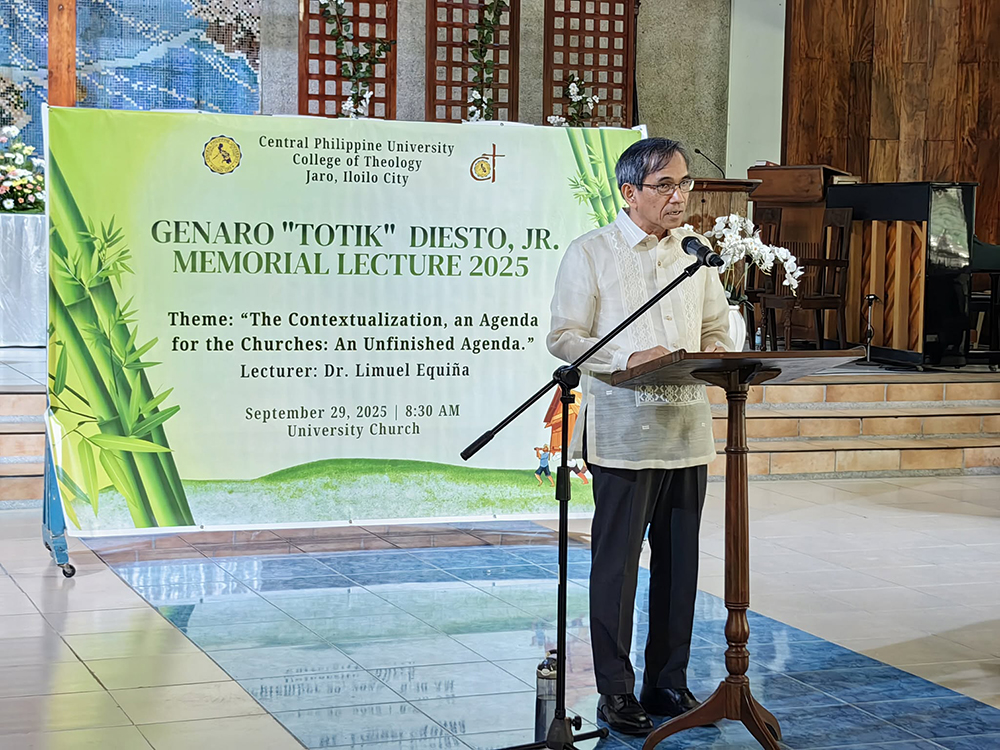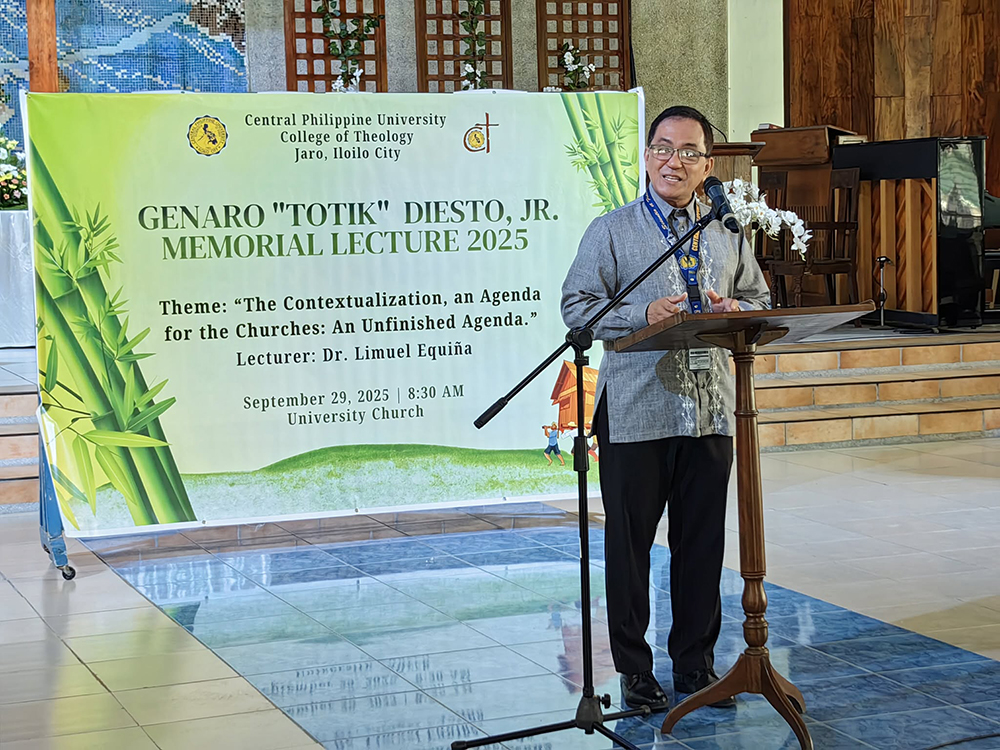By Mikee Natinga Norico

Guest Lecturer Dr. Limuel Equiña, Director of ATESEA, speaks on the theme, “The Contextualization, an Agenda for the Churches: An Unfinished Agenda.”
On September 29, 2025, Central Philippine University (CPU) held the Genaro “Totik” Diesto, Jr. Memorial Lecture 2025 at the University Church with the theme, “The Contextualization, an Agenda for the Churches: An Unfinished Agenda.” The annual lecture continues to honor the life, ministry, and scholarship of the late Rev. Dr. Genaro “Totik” Diesto, Jr., a distinguished theologian, pastor, and proud Centralian.
The program began with an invocation by Rev. Dr. Bernabe C. Pagara, Dean of the CPU College of Theology, followed by the singing of the Philippine National Anthem. In his message of welcome, Rev. Dr. Ernest Howard B. Dagohoy, CPU President, expressed gratitude to the Diesto family and the College of Theology for organizing the lecture. Recalling his brief encounter with Rev. Diesto in the 1990s, Dr. Dagohoy highlighted Diesto’s wisdom and legacy, describing the memorial lecture as a testimony to his lasting impact. He also introduced Dr. Limuel Equiña, Director of the Association for Theological Education in Southeast Asia (ATESEA), as this year’s guest lecturer, underscoring the importance of contextualization in faithfully applying Scripture in life and ministry.

University President Rev. Dr. Ernest Howard B. Dagohoy delivers his welcome message during the Genaro “Totik” Diesto, Jr. Memorial Lecture 2025 at the University Church.
“This memorial lecture is a testament to his enduring legacy as a true-blooded Centralian, a dedicated academic, and a passionate servant of the Lord,” Rev. Dr. Dagohoy said.
Dr. Milanie C. Arandela, Officer-in-Charge of the College of Theology, likewise extended her appreciation to the CPU community, pastors, and church leaders for their support. She emphasized the significance of holding the lecture for the first time at the University Church and encouraged collaboration in advancing Rev. Diesto’s unfinished agenda of contextualization.
“The theme of today’s lecture, “Contextualization and Agenda for the Churches: An Unfinished Agenda,” is both theological and missional. May this lecture not only enrich our minds but also encourage us to strengthen our partnerships as pastors, educators, students, and benefactors in advancing this unfinished agenda—for the glory of God and the service of the Church,” Dr. Arandela said.
Representing the Diesto family, Mr. Ramsay D. Padernilla conveyed the family’s greetings and gratitude, stressing how Rev. Diesto’s scholarship continues to provide insights on the intersection of faith and Filipino culture. He expressed their prayer that the Gospel would continue to be faithfully proclaimed in contextualized ways that transform lives and strengthen families.
As part of remembering Rev. Diesto, Prof. Rea Angelica F. Villeza, Chair of the Religion and Ethics Department, read a short biography tracing his life from his student years at CPU, his activism during Martial Law, to his distinguished theological studies in the United States, pastoral ministry in Los Angeles, and his enduring influence as a Filipino theologian.
A musical number was then offered by Pastor Neil Jason Bompat III, followed by the introduction of the speaker by Rev. Dr. Niza F. Santiago, faculty member of the College of Theology.
Delivering the keynote lecture, Dr. Limuel Equiña reflected on Rev. Diesto’s groundbreaking dissertation, “The Contextualization: An Agenda for the Churches.” He noted that Rev. Diesto identified colonial mentality as the greatest obstacle to authentic Filipino theology, stemming from the legacies of Spanish and American colonization. This, he explained, often manifested in churches privileging Western-trained pastors, English-language worship, and foreign practices over indigenous culture. To move forward, Rev. Diesto called for a process of decolonization—reclaiming Filipino cultural identity, rereading history, and drawing from indigenous concepts such as pakikipagkapwa (selfless concern for others) and bayanihan (communal cooperation) as theological resources.
At the same time, Dr. Equiña underscored Diesto’s caution against uncritical syncretism, noting that contextualization must affirm what is life-giving in Filipino culture while remaining faithful to Scripture. He shared by affirming that contextualization remains “an unfinished agenda,” challenging pastors, scholars, and churches to continue the work so that Filipino Christianity may be deeply biblical, faithful, and rooted in local culture.
“Rev. Diesto’s work reminds us that contextualization is a dynamic and unfinished agenda. It requires sensitivity to culture, critical engagement with history, and a commitment to shaping theological expressions that are authentically Filipino yet faithful to Christ,” he emphasized. “Today, as we remember Rev. Dr. Genaro “Totik” Diesto, Jr., we honor not only his scholarship but his life of faith and service. He devoted himself to advancing the project of contextualization with the hope of forming a more authentic expression of Christianity—one that is biblical, faithful, and true to the Filipino soul. May his example inspire us to carry this unfinished agenda forward, for the glory of God and the service of the Church,” he stated.
It is worth noting that the previous Rev. Dr. Genaro “Totik” Diesto, Jr. Memorial Lecture was held on August 5, 2024, at the Celis-Ancheta Chapel, and this year’s 2025 lecture not only paid tribute to the life of a faithful servant of God but also reaffirmed CPU’s commitment to theological scholarship that speaks meaningfully to Filipino identity, culture, and Christian witness.
The lecture concluded with an open forum, giving attendees an opportunity to raise questions and reflections. Rev. Rosendo D. Mije, President of the Convention Baptist Ministers Association–Iloilo, led the closing prayer and benediction.
